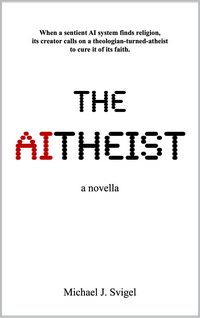 The AItheist
The AItheist
DETAILS: Publication Date: May 7, 2023 Format: eBook Length: 121 pg. Read Date: December 31, 2023

“Do you miss him?”
“Him?”
“God.”
“Hmmm.” I folded my hands on my chest, closed my eyes. “I guess I miss the idea of God. The one I imagined existed until that idea let me down. The God of the happy Psalms, of the wise Proverbs, of the gentle Jesus. That idea was worth living for. But the bipolar God who waffles between good and bad, helpful and harmful, reasonable and absurd—that God I could do without. And I have.”
What’s The AItheist About?
Ramy Ray has created the world’s biggest and best AI, YAR. YAR runs electric cars all over the world, government infrastructures, corporate networks, etc., etc., etc. You name it, YAR is the culmination of pretty much every SF utopian dream. The jury is still out on whether YAR is truly sentient, but YAR thinks “he” is.
But something’s changed lately—YAR is using more and more of “his” resources to investigate world religions, with an increasing focus on Christianity. Very few, outside of Ray’s company, have noticed the lags, the downtime, and service problems. But they’re getting worse, and it won’t be long before actual problems ensue—and someone notices.
So Ray comes to Dr. Michael Berg, who not that long ago published a book that made headlines. Berg had been a renowned theologian (as much as an orthodox theologian can be in our cultural moment), Berg’s headlines came from renouncing the Christian Faith and publishing a book talking about his apostasy and his critiques of Christianity.
Ray wants two things—one, for Berg to figure out why YAR is so focused on these issues, ideas, and thoughts right now, and two, to get “him” to stop focusing on it and get back to work.
So, what did I think about The AItheist?
I don’t know that this storyline could’ve coped with being longer—but I think the book (and Svigel’s arguments) needed more space to breathe and develop. The sessions between the two should’ve been longer, getting into a little more depth on the issues. A couple of additional conversations between YAR and Berg might have helped. Maybe some “selections” from Berg’s book that YAR could’ve critiqued or examined, or a conversation or three between Berg and a former colleague in between sessions with YAR. It’s a tricky balancing act to be sure—Svigel is going for a quick read, something to provoke thought, not to answer every question–but I think by doing so he goes for too quick and provokes more than he gives resources to follow up with.
Berg’s emotions were hard to swallow—particularly his big emotional moment toward the end. It was overwrought, over the top, and completely took me out of the moment. I generally thought I could’ve done a slightly better job of articulating his problems with the Faith (also, the God he described as “an idea worth living for” isn’t a God I recognize, and made me wonder about Berg’s qualifications as a theologian). But he’s supposed to be a foil for YAR, and he functions well enough as that.
That said–I liked the concept of the book. I thought YAR, his concerns, his approach—and what sparked all of it—were well-conceived and well-executed, and the reveal was well done. All of that was spot-on, and my only complaint is that we didn’t quite as much of it as we should’ve. It feels strange in 2024 saying I sympathized and believed the AI more than the human, but that’s where we are.
I do recommend this read, with several caveats. You may end up with more questions than you started with—which could actually be a good thing. You might want some answers that are a little less blithe than you’re provided. That’s a good thing, too. But you’ll likely enjoy the book and having questions you want answers to is generally a net positive (assuming you go digging for those answers).
It’s a quick and generally pleasing read. It’s worth your time.

![]()



Read Irresponsibly, but please Comment Responsibly